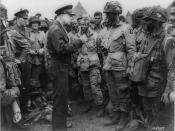AP American History, period 1 22 May 2011
War: A Growing Business
Until the Second World War, it was not a well-trained army that fought America's battles, but ragtag militias. American fighting forces were comprised of local groups of farmers and workers, "makers of plowshares, [who] could, with time and as required, make swords as well" (Eisenhower). Recurrent in American politics was the urge to maintain neutrality and neutral shipping rights and manufacturing factories, albeit prominent in the Northeast, were not focused upon producing armaments. However, by 1950, the national budget had undergone drastic shifts, radically changing areas of government received funding. World War II had dramatically changed how the United States viewed warfare, ridding the nation of its ideology that war was necessary only when attacked. Rather, the post-war United States economy promoted aggressive foreign policy, and developed a militaristic stance which derived its existence from, and vigorously promoted a belief in, the existence of looming national peril.
The conjunction of an immense military establishment and a large arms industry led President Dwight D. Eisenhower to warn against a "military-industrial complex" or a self-propagating "military machine so big that it just has to be used" (Schuster). However, following World War Two, most politicians, uniformed military leaders, and so-called defense intellectuals agreed: the technological dangers postwar America faced were omnipresent and unprecedented. Keeping those dangers at bay demanded preparation as well as a willingness to act quickly and ruthlessly. Thus "three and a half million men and women [were] directly engaged in the defense establishment," and military expenditures eclipsed "the net income of all United States corporations" (Eisenhower). Pressure during the Cold War to develop sophisticated weaponry, the failure to demobilize troops after World War Two, and use of contractors by the defense department perpetuates misappropriation of spending and makes...


